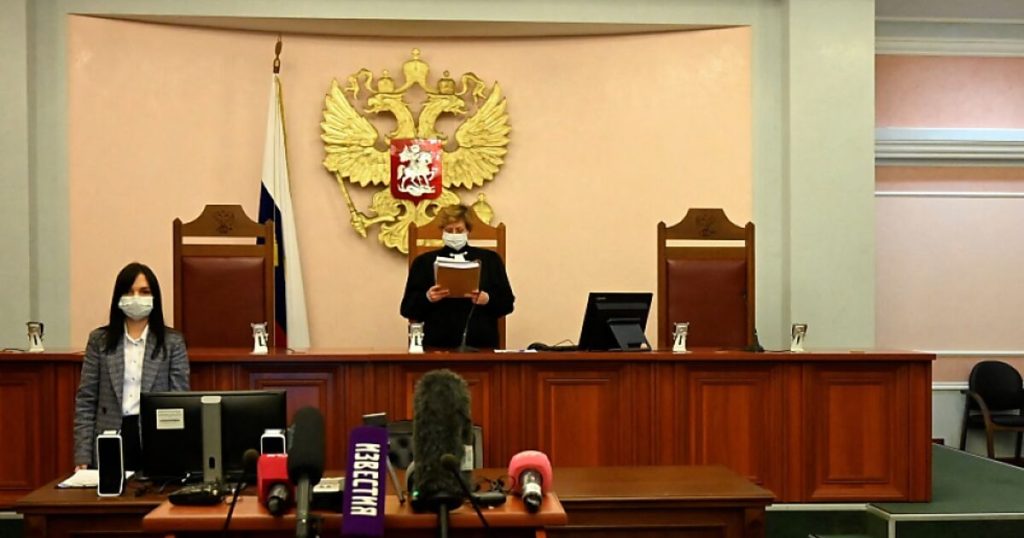A day after the ban on the Russian human rights organization Memorial, a Moscow court also dissolved the NGO’s Human Rights Center on Wednesday. The Center for Human Rights campaigned for the rights of political prisoners as well as minorities such as immigrants and homosexuals. Prosecutors accused the center of “actively” supporting extremist organizations. The ruling caused international panic.
A spokeswoman for the United Nations High Commissioner for Human Rights, Michelle Bachelet, told AFP that the United Nations “deeply” regrets the decision by the Russian judiciary to dissolve the two organizations. “It will dissolve two of Russia’s most respected human rights groups and further weaken the country’s dwindling human rights community.”
The spokeswoman said that a free, diverse and active civil society is vital for any society, and “legitimate voices of civil society, including through the use of the term ‘foreign agent’, should not be stigmatized.” She called on the Russian authorities to protect and support individuals and organizations working for human rights. .
The Foreign Ministry in Berlin was told that the decision “contradicts international obligations to protect basic civil rights, which Russia has also entered into.” Criticism came from the United States and the European Union.
Jan Rachinsky of the memorial administration announced that he would initially proceed against the ruling in the Russian courts. “It is absolutely necessary to appear before the European Court of Human Rights (in Strasbourg),” he was quoted by the Interfax news agency as saying. As the day before in the umbrella organization negotiations, many people demonstrated in front of the court on Wednesday against the new ruling.
At the court session, the prosecution stated that the Center for Human Rights itself “violated human rights and freedoms.” This justifies the dissolution of the organization. In addition, the center was certified as lacking transparency in financial matters.
A representative from Memorial’s legal team said before the hearing that the team had expected to be convicted and subsequently banned from the Center for Human Rights. And this is clear.” At the court hearing, the head of the Memorial Center for Human Rights, Alexander Cherkasov, warned of the general effect of banning his organization. If it is actually forcibly dissolved, Cherkasov said, it would be “a confirmation that persecution for political reasons has become a systematic reality in our lives.”
“The brutal closure of the Memorial Center for Human Rights, which has helped thousands of people inside and outside Russia over the past 30 years, represents another blow to civil society in Russia,” said Mary Struthers of Amnesty International on Wednesday.
On Tuesday, Russia’s Supreme Court ordered the dissolution of Memorial International on the grounds that the organization had violated the Foreign Agents Act. The law imposes strict requirements on NGOs that receive financial support from abroad. Memorial has been campaigning for reconciliation with Stalinist crimes in the Soviet Union and for the protection of human rights in Russia today for more than 30 years. The NGO is one of the most important civil society organizations in Russia.
The ban on Memorial International was condemned internationally on Tuesday. The Austrian Foreign Ministry spoke of a “strong blow to all independent voices in Russia”. The Foreign Ministry in Berlin called the ruling against the organization “more than incomprehensible,” while US Secretary of State Anthony Blinken spoke of “an insult to the cause of human rights everywhere.” The Russian people “deserve better”. EU foreign affairs representative Josep Borrell expressed his dismay and warned that “a critical look at its past is indispensable for the development and progress of society.”
After Memorial International itself in Russia was accused of including about 20 Nazi collaborators in its database with three million entries about victims of state repression and thus the rehabilitation of Nazi criminals, the International Auschwitz Committee also called us Wednesday (IAK) to speak. “Auschwitz survivors around the world have been following the work of the people involved in the memorial for many years with great respect and great sympathy,” said Christoph Hubner, Vice President of the IAK. What the people of Memorial have achieved through their work for human rights is shining far in Europe. “The attempt by the Russian authorities to turn back time and destroy the idea and work of Memorial will not succeed,” he said.
Memorial Center for Human Rights focuses on the rights of political prisoners in Russia and minorities such as immigrants and homosexuals. The Center publishes every year a list of political prisoners. More recently, the Center has repeatedly noted the fate of the imprisoned opposition politician Alexei Navalny, whose organizations in Russia are classified as “extremist”.
The decisions made by the Russian courts regarding the monument are not surprising. After two Russian prosecutors’ offices submitted simultaneous applications for liquidation in relation to parent and subsidiary organizations on November 8, the FSB was supposed to play a coordinating role in this case. APA interlocutors said at the time that the liquidation of the Center for Human Rights, which had greatly irritated powerful intelligence officers with lists of political prisoners for more than a decade and a half, was considered a done deal. At the time, Memorial International was given “little chance” not to disband. However, after Russian President Putin criticized the memorial in December, those small opportunities also disappeared.

“Food practitioner. Bacon guru. Infuriatingly humble zombie enthusiast. Total student.”








More Stories
Kyiv: Russian Kursk offensive halted
US Presidential Election: Former US Government Officials Warn Against Donald Trump's Election
Netherlands wants to leave asylum system